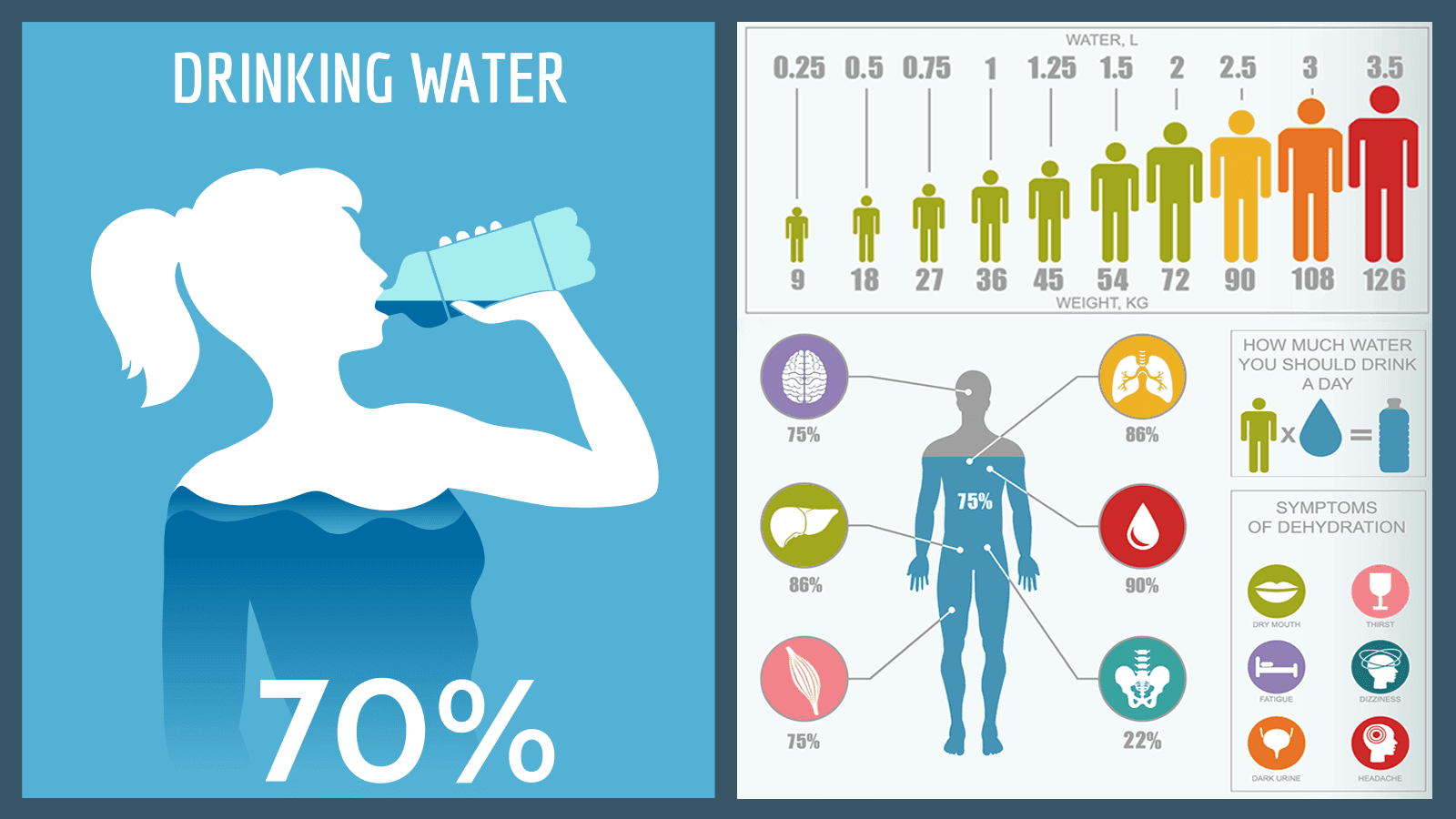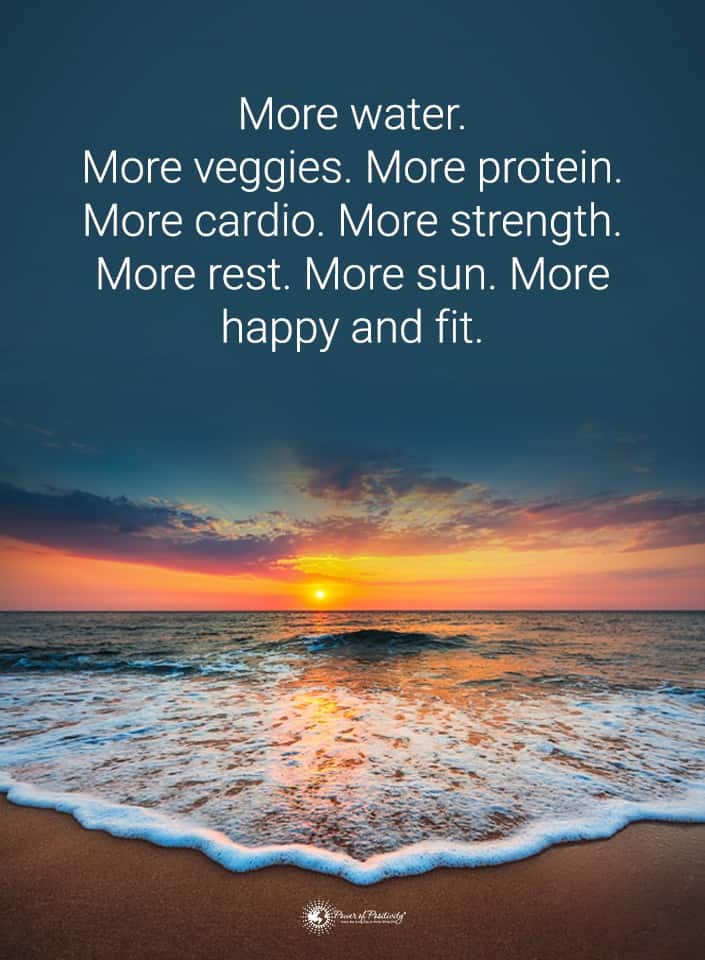You’ve likely heard that you need eight glasses of water each day, but that isn’t always the case. Some people need more, and others can get by with less. Figuring out how much you should drink every day depends on many factors, including how much you weigh.
The amount of water someone should drink each day is different for everyone. Your body’s cells all need hydration, and they want the best quality, but your positive thinking mind is wondering how much you should drink.
How Much Water Should You Drink Every Day
Your body has a sense of what it needs, whether focusing on weight loss or providing your body with the tools necessary to be healthy. You want to arm yourself with the knowledge you need to give your body healthy hydration levels.
1. Are you Hungry or Just Thirsty?
If calories were the only thing that contributed to weight gain, replacing regular full-calorie drinks with diet beverages would make you lose weight. However, according to a scientific study, water is the best option.
This beverage did better for reducing body measurements and even improving insulin resistance than drinking diet beverages. Thirst can often be mistaken for hunger by our minds because they are busy managing our day, so it’s not paying that much attention to the body’s many cries for hydration.
Your body’s hydration needs get fulfilled when you drink enough for each cell to be filled, allowing nutrients to flow across cell membranes and stimulating all the other vital functions of the body. When we lack hydration, bodily functions begin to slow down because they can’t carry out their duties.
2. How Much Water Should You Drink if You’re Working Out?
Online bodybuilding calculators will encourage you to hydrate even more if you exercise. Drinking more is so that you can replace the hydration your body loses through sweat. For a workout that takes you more than an hour, you should take in approximately 75% of your body weight.
3. How Much Should You Drink if You’re Not Exercising?
If you don’t regularly exercise, your ideal amount will differ. You should drink a minimum of one gallon per day for healthy tissues and weight loss support, whether you exercise. Remember that temporarily seeing an increase in ounces on the scale after you drink does not equate to an increase in body mass.
Water doesn’t only help replenish lost fluid after exercise. Drinking plenty has the following health benefits:
- Boosts mood
- Improves cognitive abilities
- Improves energy
- Increases alertness
- Decreases feelings of hunger
4. How Much Should You Drink for Weight Loss?
Increasing the quality and quantity of your beverage will increase your weight loss and health benefits. The gallon per day is not enough to achieve a positive change and improvement in health and weight loss. Bodybuilding water consumption calculators suggest a minimum of 64% of your body weight for targeting lower body fat.
Drinking enough quality mineral spring water according to your weight helps:
- Flush toxins from your body
- Flush excess waste from the digestive system
- Improve muscle recovery after workouts
- Reduce cravings
Focus on weight loss and learning how much you should drink to achieve your desired results. The consensus seems to be to drink a minimum of half your body weight in ounces every day and increase that amount if you are doing workouts. Positively thinking people know that increasing their intake based on their exercises and weight loss goals is better for optimal health.
Note: Always consult your wellness advocate before starting any new regimen.
8 Ways to Increase Your Water Intake
Now that you know why it’s essential to stay hydrated, it’ll help if you know how to do so. It’s easier than you might think, and these ideas can help you get started.
1. Know How Much You Need
Understanding your fluid needs is essential to increasing your intake. Take the time to figure out how much you should drink based on the above factors. You’ll find many differing answers online, but it depends on many factors, including activity level, location, health status, and other things.
2. Carry a Reusable Bottle
When you keep a reusable bottle with you, it’ll help you take in more fluids. Whether you’re running errands, sitting at home, working, or traveling, you’ll have a drink nearby constantly. It is a visual reminder to drink more fluids, encouraging you to sip throughout the day.
You’ll quickly reach your fluid goals by consistently taking sips throughout the day. You don’t have to drink an entire bottle at once, as you’ll find that the small drinks empty your bottle quickly.
3. Replace Other Drinks
Replacing other drinks can help you take in more water while boosting your health and reducing calorie intake. Start by replacing soda, sports drinks, and anything else with added sugar. These drinks are detrimental to your overall health, and they stand in your way of hydration.
It might help if you know how detrimental sugary beverages are. Even eight ounces of soda can exceed your daily recommended sugar intake. They contribute to weight gain, obesity, type 2 diabetes, heart disease, and other conditions.
If you miss the flavor, you can add some to your healthy beverage to help you drink more. Consider infusing your drink with fruit or use powder or liquid flavoring. Whatever you use, avoid artificial sweeteners or additives because some flavor options contain these ingredients.
4. Establish Routines
With hydration routines, drinking water becomes a habit for you. Your regime should extend throughout the day, with specific times you take in fluid.
Start in the morning, drinking a full glass as soon as you wake up or after you brush your teeth. It gives you a good start on your hydration goals and boosts your alertness. After that, drink a glass after each bathroom break to continue implementing beneficial habits.
Then, make it a point to drink a glass before each meal. With three meals a day, that would add three cups to your daily intake, a jump if you didn’t do that before.
Plus, drinking before meals can help you determine if you’re confusing thirst for hunger. It also fills you up and prevents you from consuming too many calories during the meal. If you frequently drink coffee, make it a point to drink a glass of water each time you brew a fresh pot.
When you’re at work, make it a point to drink a glass each hour. For an eight-hour workday, this will immensely boost your daily intake.
Finally, drink a full glass before you go to bed at night. It prevents you from waking up because of a dry mouth and keeps you hydrated until morning. These habits will immensely increase your hydration intake.
5. Set Goals and Reminders
You should always maintain hydration goals if you want to improve your health. Setting a goal can motivate you, but only if they’re specific, measurable, and realistic. Choose a set amount to take in, and record your progress throughout the day.
Your goals should also be time-bound, so determine how much you’ll drink by a specific time of day. Make sure your timeframe is attainable so that you can feel the achievement of reaching your goals. Set your timeframes for every eight ounces for the best sense of accomplishment.
It might help if you set the alarm for hydration, too. A thirty-minute reminder to finish your current glass or take a few sips can make a difference.
6. Invest in a Water Filter
Even if it’s safe to drink from your tap, you’ll be more likely to stay hydrated if you have a filter. You don’t have to spend a ton of money, as filters don’t have to be expensive. Filters make your beverage taste better and reduce levels of contamination.
Using a filter is also better for the environment than using disposable bottles. Plus, it is less expensive long-term, so you’ll save money.
7. Reward Yourself
When you reach your hydration goals, make sure to reward yourself. It’ll make you want to keep achieving the goal, helping you form beneficial habits. You can treat yourself to a latte or extra time watching your favorite show.
Make sure your reward is something you don’t already do, or it won’t help you achieve your goals. Your reward should be something that you look forward to, so you keep it in mind each day.
8. Eat Fruits and Vegetables
Fruits and vegetables contain water, so eating more of them will increase your fluid intake. Some of the best options include:
- Watermelon
- Lettuce
- Celery
- Cucumbers
- Melon
- Grapefruit
- Cantaloupe
- Honeydew melon
- Grapes
- Zucchini
- Tomatoes
- Cabbage
These foods are perfect for snacks, but you can also use them in your meals. They increase hydration and contain vitamins, minerals, and antioxidants.
Final Thoughts on Drinking Enough Water Every Day
The amount of water you should drink each day differs based on your weight and other factors. Hydration is essential for good health, and it can make all the difference in how you feel.
If you can’t seem to form the good habit of staying hydrated, these tips can help. It’s easier than you think, and you’ll quickly develop beneficial habits.



















